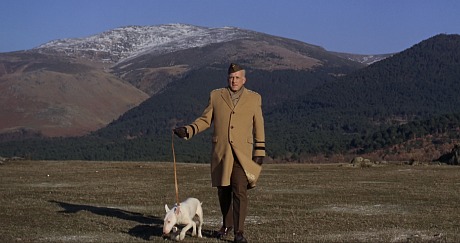There are great movie finales, or ones that end on a sum-up note that is fair, concise, honest, eloquent. And there are finales that do all that but also reach inside and push that button that you yourself don’t know how to find, much less push, half the time. A kind of sinking-in sensation in your soul. A sense of sudden wisdom and sadness and being oddly at peace with everything, including your own miserable self. This is how I’ve felt time and again during the last 90 seconds of Franklin J. Schaffner‘s Patton (’70), and particularly upon hearing the words “all glory is fleeting.”

It sure as hell is along with everything else worth cherishing…romantic love, freshly-shined shoes, a perfectly tuned six-cylinder engine, purring cats on your lap, world-class wifi, general ecstasy, feelings of absolute security, exquisite guitar playing, momentary pride in a difficult achievement, warm sunshine, the balm of friendship and camaradarie, the sight of snow-capped mountain peaks against a sparkling blue sky, perfect glasses of pineapple juice, Everett Sloane‘s girl in a white dress on the Staten Island ferry…don’t get me started. All of it streaming past, leaves on a mountain stream, nothing to have or hold. Either you savor your passing delights as impermanent and all the more valuable for that, or you don’t.
“For over a thousand years, Roman conquerors returning from the wars enjoyed the honor of a triumph — a tumultuous parade. In the procession came trumpeters and musicians and strange animals from the conquered territories, together with carts laden with treasure and captured armaments. The conqueror rode in a triumphal chariot, the dazed prisoners walking in chains before him. Sometimes his children, robed in white, stood with him in the chariot, or rode the trace horses. A slave stood behind the conqueror, holding a golden crown, and whispering in his ear a warning — that all glory is fleeting.”
God: “What do you want from me?” Me: “I don’t know. The good moments lasting a little longer?”
